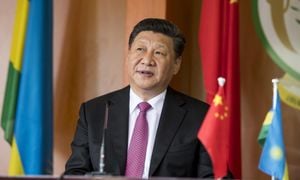On October 7, 2023, Israel was shaken to its core by an unprecedented attack from Hamas, which left dozens dead and hundreds kidnapped. The shockwaves of this horrendous event continue to ripple through Israeli communities, with significant political and social ramifications. Just over thirteen months later, the repercussions are still acutely felt, particularly by those from the affected areas like Kibbutz Nir Oz, where Finance Minister Bezalel Smotrich recently made his first visit since the attack.
During his visit, Smotrich walked through the remnants of Nir Oz, grappling with his feelings of responsibility and guilt for the events leading to the terror. He met with families of hostages who remain unaccounted for, including 29 residents still presumed captive in Gaza. He listened to their harrowing stories of loss and desperation, facing accusations and painful reminders of the lives torn apart by the attack.
One poignant account was shared by Sharon Aloni Cunio, who, along with her young daughters, escaped captivity, but whose husband David remains missing. Standing where her home once stood, she expressed her anguish to Smotrich, asking him to contemplate the uncertainty her family faces. “I have children who are currently fatherless,” she told him, her voice trembling with emotion. “Think about David for a moment... Imagine him being so close to here, and we can’t do anything about it.”
Smotrich's visit is particularly important not only because of the emotional turmoil but also as it reflects the tensions brewing within the Israeli government about how to handle the myriad challenges the nation faces following the attack. While he assured the residents of Nir Oz of the government’s commitment to bringing home the hostages, he simultaneously acknowledged the tragic realities of leadership and the moral weight carried by officials like him.
“I’m not sure I would have been able to invite someone who is responsible for their suffering,” Smotrich admitted, hinting at his recognition of the governmental failures leading up to the October attack. Previously, he had dismissed responsibility, apparently viewing the tragedy merely as part of broader military miscalculations. Now, he is confronted with the human reality behind those statistics, hearing firsthand accounts of grief and loss.
The community of Nir Oz, on the brink of emotional and physical collapse, voted recently to rebuild, viewing this effort as a victory over their devastating past. The sentiment among residents is one of resilience, underlined by their shared goal of returning to their homes and lives, even as they grapple with the trauma of what has transpired.
Across the Israeli political spectrum, the tragedy has stirred deep discussions about security policy and governmental accountability. Smotrich's presence at Nir Oz may symbolize the beginning of these dialogues as families call for urgent action and priority on hostage negotiations, urging more direct steps from the ministerial level.
The humanitarian crisis engendered by the conflict has not only impacted families but also raised concerns globally, with protests erupting and a polarization of opinions forming around the Israeli government's strategies. The increasing violence has found its way to streets across America, as evidenced by protests against perceived U.S. support for Israel, which have put local and international diplomacy to test.
These protest movements highlight the varied perspectives people hold, from staunch support of Israel’s right to defend itself against terrorism, to calls for humanitarian relief for Palestinians under Hamas leadership. Concerns surrounding the loss of civilian lives during military operations have sparked debates about ethical military actions and accountability. For many, the call to action has taken the form of demands for immediate humanitarian access and pressure on both the Israeli government and Hamas.
Politically, these events have rippled through not just Israel but also to American leadership, as both Democratic and Republican factions navigate their relationships with Israel whilst responding to the needs of various constituencies back home. Former U.S. President Donald Trump has signaled his support for Israel, touting policies from his last administration which included moving the U.S. embassy to Jerusalem, yet the 2024 election dynamics could shift perspectives dramatically.
Trump’s recent reelection has reignited debates over U.S. support for Israel. Israeli officials, including Akunis, the consul general for Israel, remain hopeful for bipartisan collaboration across the ocean. Akunis stated at recent interviews, “We respect the decision of the American people... They may have voted on issues like cost of living, inflation and immigration and of course on foreign policy. Israel is always a big issue.”
The emotional turmoil faced by the families of hostages has turned their plight not just personal but communal. Activism among hostages’ families continues to grow, attempting to keep the memory and urgent need for action alive within political conversations. This activism was epitomized during a recent rally where families gathered to share their stories, and remind politicians of their loved ones’ continuing captivity.
But as the government, local communities, and international observers navigate this tangled web of urgency, the mental toll on survivors and families of victims continues to grow. The challenges are immense: balancing national security, humanitarian obligations, and the need for healing and recovery.
Underlining the challenges is the recognition of mental health repercussions among both residents of Kibbutz Nir Oz and families impacted throughout Israel. The gravity of the crisis has opened discussions about long-term support mechanisms, emphasizing the urgent need for comprehensive mental health services to aid those grappling with trauma. The Israeli public is still reeling, and through increasing dialogue and advocacy, there is hope for systemic supports to emerge.
Meanwhile, foreign observers look on, torn between support for Israel’s security needs and the humanitarian crises developing on the ground. The strife continues to underline the importance of balanced and informed dialogue among all parties involved, fostering solutions respectful of both safety and human rights.
There is hope, albeit fragile, represented by families committed to advocating for their loved ones, communities determined to rebuild, and international diplomacy seeking sustainable peace. Smotrich’s visit to Nir Oz may serve as both a reminder of the past and as groundwork for future steps toward healing the wounds opened on October 7. The resilience of the human spirit shines through even amid despair.



